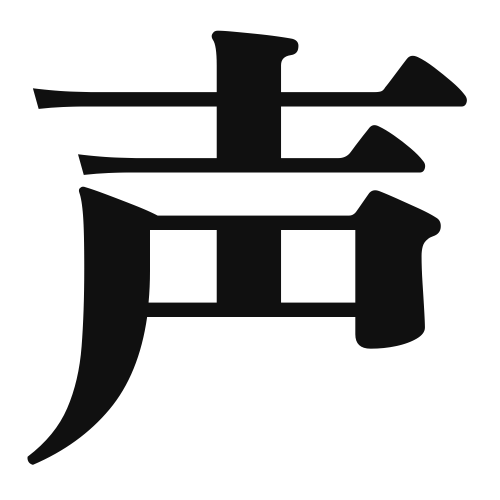1. Overview of Meaning
The kanji “声” (pronounced “koe”) means “voice” or “sound.” It refers to the sound produced by humans or animals, often associated with speech or vocalization.
2. Formation and Radical
The kanji “声” is a phonetic-ideographic character (形声文字). It combines the radical for “sound” (音) with a phonetic component that suggests its pronunciation. The radical indicates that the character is related to sound or voice.
The radical for “声” is 音, which means “sound.” This radical is commonly found in other kanji related to sound.
3. Examples of Usage
Common words and phrases that include “声” are:
- 声優 (せいゆう, seiyuu) – voice actor
- 声楽 (せいがく, seigaku) – vocal music
- 声を出す (こえをだす, koe o dasu) – to raise one’s voice
Example sentences in daily conversation:
- 彼の声はとても素敵です。 (かれのこえはとてもすてきです。) – His voice is very nice.
- 声を大にして言ってください。 (こえをだいにしていってください。) – Please speak up.
4. Synonyms and Antonyms
Similar kanji with related meanings include:
- 音 (おと, oto) – sound (refers more generally to any sound, not just voice)
- 響 (ひびき, hibiki) – echo or resonance (implies a deeper or more profound sound)
Antonyms include:
- 静 (しずか, shizuka) – quiet or silence (indicates the absence of sound)
5. Cultural and Historical Background
The kanji “声” is deeply connected to Japanese culture, where voice plays a significant role in communication and expression. In traditional arts like Noh and Kabuki, the voice is essential for conveying emotion and storytelling.
Proverbs and idiomatic expressions that include “声” are:
- 声を大にする (こえをだいにする) – to speak loudly, often used to encourage someone to express their thoughts.
- 声がかすれる (こえがかすれる) – to have a hoarse voice, indicating a need for rest or care.
